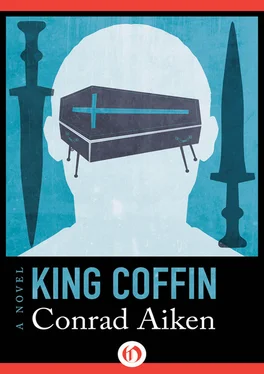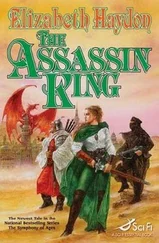When the train climbed into the sudden sound of wind, the flood of daylight, on the Cambridge Bridge, sun flashing on windblown and dancing water, the sound of the train itself diminishing, it became possible to see the sallowness as more marked, the hollows beneath the eyes as more pronounced. And also a something melancholy or disillusioned in the eyes gave the lie to the amused impudence of the mouth. The eyes were a good blue, very deep, but inward-looking: self-centered. The mouth, under its short fair mustache, had about it a small air of authority. A tyrant in his own Lilliputian world: a domineering ant. A little bully.
At Park Street, it was easy to follow him, for as before he walked slowly and reflectively, hands in pockets, he seemed to be in no hurry, and to be enjoying the crowded scene, the cross-rush of opposed currents of pedestrians, some towards the North-bound cars, some to the South, himself sauntering beside the train, and now and then glancing into it, as he moved toward the escalator. Arrived on this, he stood quite still, did not turn, allowed himself to be borne upward to the surface with complete immobility. There he stepped off and turned to the left.
The thing was going perfectly: it could not have been better. And if now, as appeared likely, he was going to walk to his destination, it would be extremely simple. This was the advantage of great height. It was easy to follow because it was easy to see. Lagging fifty feet behind, one could observe every movement of one’s victim as from a tower. Unless he took a taxi — but he had already passed the Park Street stand — there could be no difficulty. Except for the matter of turning corners, following people in the street was simplicity itself: but when they turned a corner, one must be prepared to run. More than once, on such an occasion, he had found that in the interval between the disappearance of the stranger round the corner, and his own arrival there, the stranger had vanished: and into any one of so many possible doors that further pursuit was impossible. This time there must be no such mistake.
At the corner of Bromfield Street — and it amused Ammen to reflect on the literalness with which his own path of last night was being followed — the tweed hat hesitated, as if about to turn to the right, but then proceeded. It crossed Tremont Street to the graveyard, sauntered slowly along beside the railings, turned once to look in at the pigeons and squirrels, but without pausing, and presently had crossed Beacon Street. It was curious: the fellow positively seemed to have the air of knowing that he was followed. That turn of the head, the peculiar way he had hesitated at the corner of Bromfield Street, and moreover the almost studied insolence and self-consciousness of his back—! Was it possible? No, certainly not. Any watched person looks watched. A suspected person looks guilty. Just the same, it would be as well to be careful. He remained on the other side of the street, strolled slowly beside the gray churchyard of King’s Chapel, his eyes fixed on the little bobbing hat, and suddenly found himself thinking of Breault. Breault! This little man was like Breault — why hadn’t that occurred to him before? Absurdly like him. The same sort of little homunculus, the enforced dignity of the man small of stature, the pathetic truculence of the weak. The sort of ridiculous boldness which is quintessentially an invitation to death: the one-who-wants-to-be-killed. The one who wants to be killed!
And why not Breault?
There would indeed have been a special and beautiful irony in choosing an anarchist — and a Chicago anarchist to boot. As if one had managed to murder Louis Ling. Or Czolgosz.
And odd how that the pattern should thus be turning round on itself, himself now again passing Tremont Temple thirteen hours later, with the echoes of that scene still whispering on those stairs, in that absurd room, still ordering the separate behaviors of those ridiculous people! Mrs. Taber, with her feather duster, was at this minute probably talking about it in the C Bookshop to Miss Gerber, the lumber merchant’s daughter. At half past ten the shabby little fake analyst would come in — Meyer — to pick up gossip or blab the dirty secrets of his patients, throwing out dark hints as to their social importance. He would be told about it, and snigger, and recount for the hundredth time his story of the dinner he had given at the “Athens,”—that experimental dinner when he had provided a department-store salesgirl for each one of his highbrow guests, with instructions to try to seduce them, so that he could observe their behavior — and particularly the behavior of Ammen. “And Ammen never said a word. He just sat here and never said a word. Do you think he’s human, Mrs. Taber?”
Suddenly he found himself running.
At the Beacon Theater the hat had stopped, pivoted, and then with accelerated pace proceeded once more in the direction from which it had come: seeing that a change of traffic signals at the foot of Beacon Street was imminent, the little man had himself begun to run. As it was safer to run behind him than parallel with him, Ammen zigzagged through the traffic of Tremont Street, was just in time to drop to a walk again at the corner entrance of Houghton and Dutton’s and to cross ten feet in his rear: a little too close for comfort. A narrow escape, and it turned out, immediately, to have been even narrower than he thought: for at once the hat swerved to the right and entered the door of S. S. Pierce. Another moment and he would have been too late: caught by the stream of traffic, he would perhaps have been unable to see in what direction his quarry had gone, or into which of a multitude of doors. As it was, there was no great danger in following him into the store, which was reasonably crowded; there was plenty of excuse for dawdling, as if for inspection, first at one counter and then at another. The hat preceded him, with a firmness of purpose obviously born of familiarity, to the wine and spirits department at the back. A small bottle — to judge from its size and color a pint of whisky — was there procured, paid for, and pocketed; and this done the little man once more advanced to Tremont Street, once more resumed his interrupted journey towards Scollay Square, this time pausing just perceptibly at the entrance of the Beacon Theater to glance at the posters of the movies. Two facts had thus been learned about him: perhaps not quite facts so much as the possibilities of facts: one, that he drank, but with some indication that it might be on a minor and retail scale: two, that he might be a movie fan. A third seemed to be that whatever his job was — always assuming that he had one — it must be somewhat flexible; it was well after nine o’clock, and he still appeared to be in no hurry, but to be sauntering, and looking about him, as if his purpose was at most a half-purpose, and the mere killing of time not unpleasant.
This became more evident when he arrived at Scollay Square.
He stopped at the corner opposite Epstein’s, stood still for what might have been three or four minutes, his hands deep in his pockets, the tweed hat turning first right and then left, but clearly not with any regard to the question of crossing the traffic lines. No, it was obvious that he simply hadn’t made up his mind where he was going: or perhaps at any rate that he wasn’t anxious to get there. For a moment, he half turned towards the right, and seemed to be looking fixedly down Court Street: but then he reversed his direction and began to ascend the slight hill to the Court House. It was all very peculiar: but the oddity of it was in a sense its most interesting and exciting feature. That he should be unpredictable, as much in behavior as in appearance, was of course of the very essence of the stranger: but while it was to be expected in outline, or expected in its unexpectedness, the details must naturally, like this, be surprising. No less odd was again the curious recapitulation of the events of last night. To come again past the Temple, and now to proceed by exactly the path which must have been taken by Sandbach and Breault and Mrs. Taber, to be moving as if by conscious design towards the C Bookshop, toward Sandbach’s room — all this fitted beautifully, it was his own thought made manifest, it was once more — and the vision sharpened almost painfully — as if his own awareness had been simply externalized like a life-size model of the city itself. It was like a repeated dream, but with a difference, — for it was under control, it was being directed. The whole thing was simply his own chess game, projected: it advanced or developed before him exactly as he wished, just as helplessly as the smoke which he now blew from the pipe which he paused to light, all the while watching the tweed hat above his sheltering hand. Let him go as far as he liked; let him even round the corner at the top of the Square, turn towards Ashburton Place: let him, in fact, go where he liked: he was now under control, he would never escape. He was now — and the feeling was positively physical in its sureness and power — fastened. What was even surer than that he would turn to the right or left was that whichever direction he chose he was walking deliberately towards death. He was in the act of finding his grave.
Читать дальше












